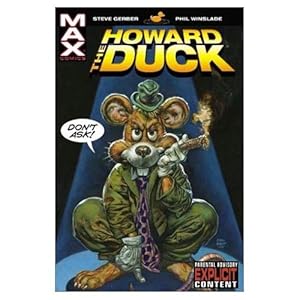
When the late Steve Gerber returned to Marvel for a final, six-issue run on his most celebrated property, Howard the Duck, I remember being incredibly excited. I've reread the series several times and smiled and laughed but nevertheless closed the book each time wishing things had worked out a little bit differently.
I believe that Howard was the best American comic book of the seventies, and it still holds up extremely well, despite the aggravating aftertaste of the many sad years that followed for Gerber fighting for his rights as a creator. He and Marvel Comics stayed at loggerheads for years. It looked for a few minutes in the mid-nineties like they'd buried the hatchet, but the circumstances behind a one-off issue of Marvel Team-Up produced then proved unsatisfying to Gerber, and the incident ended with Howard and his human steady, Bev, spirited out of the Marvel Universe and into a witness protection program at Image Comics under the names Leonard the Duck and Rhonda.
About seven years later, everybody was friendly again and Gerber returned to Marvel for what would be a final six-issue epilogue for his classic characters. Back in Cleveland and working as security guards at a junkyard, Howard and Bev are desperate and just barely scraping by, but before long, their lives are turned upside down again by the craziness of life in the 21st Century. Bev's ex-husband Dr. Bong is back in town, and his latest gene-splicing scheme not only sees Howard's body changed into a great big mouse, but getting to the bottom of things will send our heroes to find the truth about boy bands, feel-good talk shows, Vertigo Comics, Witchblade and why it is that the Father always leaves the Son and the Holy Ghost to pay for the drinks.
The artwork on five of the six issues was provided by Phil Winslade, who had earlier collaborated with Gerber on the delightful Nevada. That character makes a brief, silly cameo in these pages. On one issue, Glenn Fabry, who painted the covers of the original issues steps in. I greatly enjoy each of their work a lot, and like how they pepper the pages with in-jokes and detail.
And yet... it feels bittersweet and incomplete. I really got the feeling that Gerber had so much say to say through and about Howard, even after the final chapter, which sees Howard grilling the Almighty about the purpose of existence. In a perfect world, Marvel would have greenlit a full series that would have ran for years, until we lost Gerber in 2008. Then again, in a perfect world, we wouldn't have lost Gerber in 2008. Recommended.

